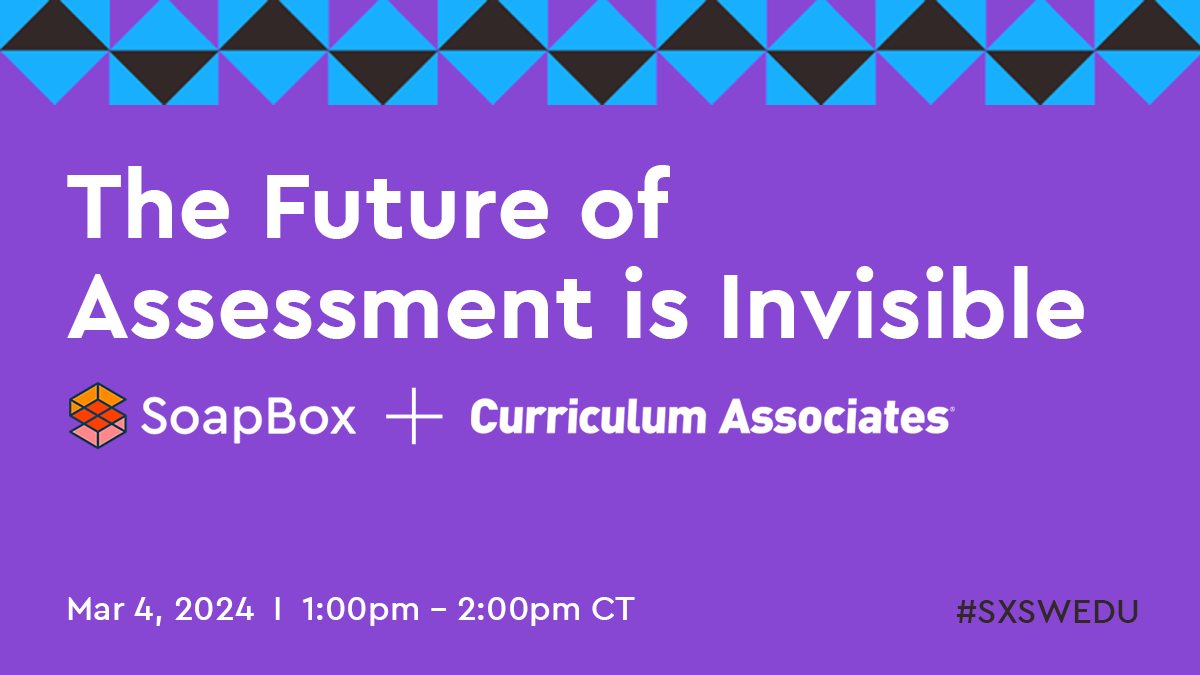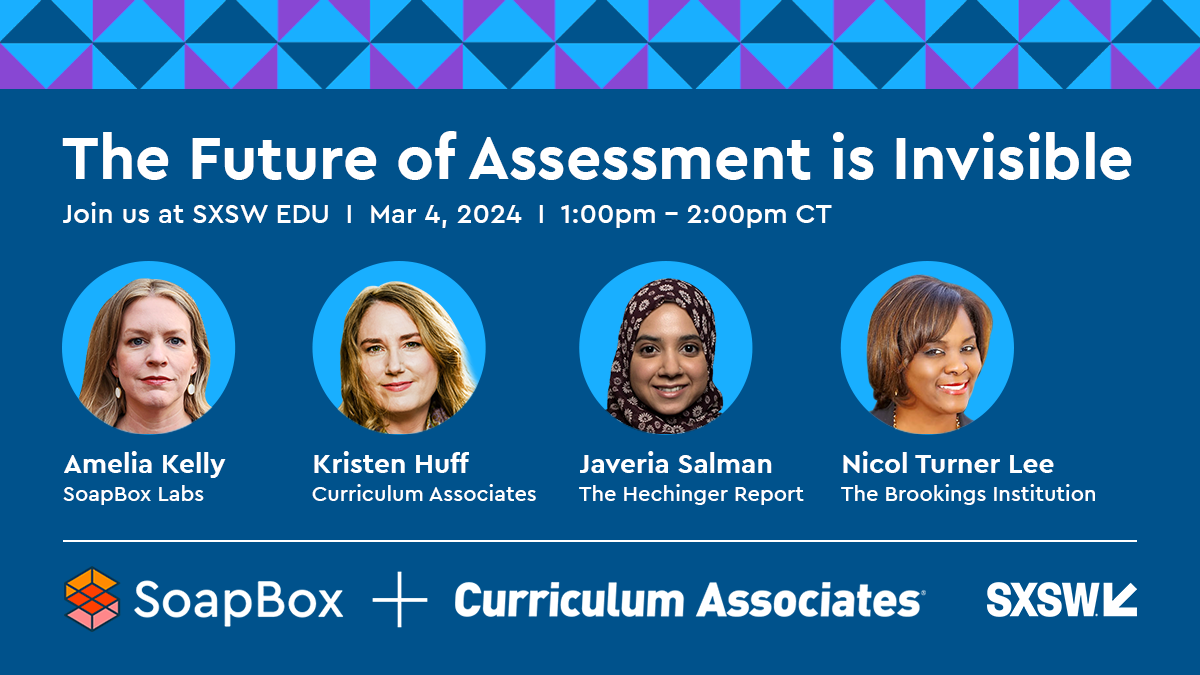Invisible Assessments – 10 Quotes from our SX Panel
March 13, 2024

Last Monday, SoapBox Labs + Curriculum Associates appeared together for the first time to lead a talk called ‘The Future of Assessment is Invisible‘ at SXSW EDU 2024.
Dr Amelia Kelly, CTO at SoapBox Labs and Dr Kristen Huff, VP Assessment and Research at Curriculum Associates were joined by Dr. Nicol Turner Lee of the Brookings Institution. The panel was moderated by Javeria Salman of the Hechinger Report who did an expert job of guiding the enthusiasm on stage and among the over-capacity audience during the Q&A!
Here are some of the views the panel shared on the future of assessments and how invisible assessments can make learning easier for students, and teaching better for teachers.
To listen to the full session go here.
Kristen – on how voice-enabled assessments support teachers
“In effective instruction, teachers are constantly updating their assumptions about what a student knows and where they are at in their learning trajectory – through observation of student work, through Q&A, through listening to group discussions. Voice-enabled assessments help teachers do what they do already, with continuous assessment data that informs the next steps of instruction, and that closes those knowledge gaps for students”.
Amelia – on the UX/UI benefits of voice-enabled assessments
“With a voice-enabled assessment, students can answer a question out loud without having to wait for multiple choice options to be called out to them. With voice AI powering ‘invisible assessments’ we can remove many of the instructions given to students, and other confounding factors like keyboards and mouses. We can focus on what we’re actually testing”.
Kristen – on norm-referenced assessments
“Norm-referenced assessments are at least 100 years old and they do nothing more than rank order students. With norm-referenced assessments, we cannot make any claims about what students know and can do, and what preconceptions or misconceptions they may have, that are preventing them from accelerating along the learning path. I think the evolution of assessments to ones that are seamless, integrated and invisible is the way forward”.
Nicol – on the idea of invisible assessments
“It’s interesting, when I think about the assessment being invisible to the student in ways that respects their care, and helps to achieve some type of learning equity, that’s something we haven’t seen for a very long time. With invisible assessments we can offer students – low income students, rural students, Black students, Hispanic, tribal students – a different learning environment.”
Amelia – on the “magic” of AI
“Speaking as somebody who builds AI, it’s not magic. It’s a set of decisions made by human beings, and the more diverse that team of people, the more robust the AI engine they build. At SoapBox, we built our models with diverse and representative data so that our system is accurate enough to use in classroom assessment and practice situations”.
Nicol – on AI and systemic inequality
“The journey we’re going on with AI has to be deliberate. And it must interrogate the outcomes as well as where we inserted AI into the design process. We can’t sprinkle AI into everything. We have to be mindful of those areas where it will be helpful and think about the people on the other side of it, who are using AI potentially as an excuse to perpetuate systemic inequality”.
Amelia – on bias in AI systems
“Human biases and cultural norms can easily get built into AI systems. That’s why some AI systems perform differently depending on the color of your skin, or the native language of your parents. Voice AI is an important tool in the goal to make assessments invisible to students, but only if it works for every student’s voice equally”.
Kristen – on the future of assessments
“Pedagogy, curriculum and instruction are at least two, if not three decades ahead of assessment when it comes to being culturally and linguistically responsive. What does it mean to create culturally and linguistically responsive assessments? We’re at the beginning of that journey and the first step is voice-enabled, invisible assessment”.
Kristen – on what’s most exciting about invisible assessments
“We’ve got to think about learning differently. We’ve got to think about instruction differently. We’ve got to think about assessment differently. And so one of the things I’m excited about is using voice-enabled assessments to help us better understand what we’re actually trying to measure when it comes to early literacy, phonemic awareness, phonological awareness or early numeracy skills, for example, and how to accelerate each student’s learning endeavors with the rich and granular data returned by a voice engine like SoapBox Labs’ ”.
Amelia – on SoapBox Labs’ voice AI vs others
“There’s a problem with a lot of voice data out there, with companies just crunching, crunching, crunching the data they’re finding all over the internet. And that data is not students practicing their oral reading fluency. It’s not students practicing their letter names and letter sounds. If you are going to put voice AI into an education or assessment product it has to be built to cater to all these different use cases”.
To listen to the full SXSWEDU session click here. We’d love to hear your thoughts on this blog and on invisible assessments! Email us at Hello@SoapBoxLabs.com.
SoapBox Labs is now part of Curriculum Associates, a leader in K-12 instruction and assessment solutions. To learn more about iReady and other award winning CA products, go to www.cainc.com




